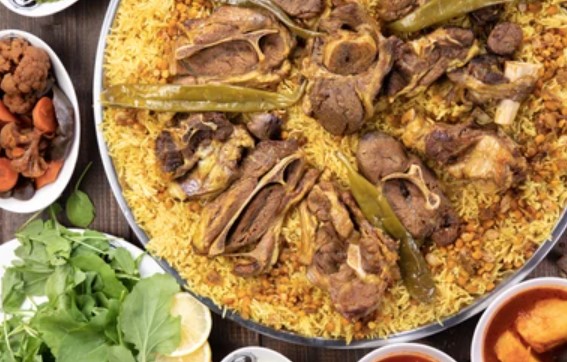Introduction: Kuwaiti Cuisine Overview
Kuwaiti cuisine is an essential part of the country’s heritage and culture. It is a fusion of Arabian, Indian, Persian, and Mediterranean culinary traditions. The flavors and aromas of Kuwaiti cuisine are influenced by the use of herbs, spices, and fragrant ingredients. Kuwaiti food is known for being aromatic, flavorful, and rich in taste.
The most popular dishes in Kuwaiti cuisine include Machboos, a traditional rice dish prepared with either chicken, lamb or fish, and spices such as cumin, cinnamon, and saffron. Another popular dish is Ghouzi, which consists of roasted lamb or mutton stuffed with rice, nuts and spices. Seafood is also a significant component of Kuwaiti cuisine, including grilled fish, shrimp, and lobster.
Halal Food and Islamic Dietary Laws
Islamic dietary laws, also known as Halal, are crucial in Kuwaiti cuisine. Halal is the Islamic term for permissible, and it refers to food and drink that are allowed under Islamic dietary guidelines. All meat, poultry, and seafood consumed in Kuwait must be slaughtered according to Halal guidelines. Pork and alcohol are forbidden in Kuwaiti cuisine.
Halal guidelines also dictate the way food is prepared and the utensils used. For instance, all utensils used to prepare Halal food must be free of any pork or alcohol residue. The consumption of Halal food is essential to Kuwaiti Muslims, and visitors are advised to respect this.
Common Ingredients in Kuwaiti Cuisine
Kuwaiti cuisine is characterized by the use of aromatic spices such as saffron, cumin, cinnamon, cardamom, and coriander. Other ingredients commonly used in Kuwaiti cuisine include rice, lamb, chicken, fish, dates, and nuts. Herbs such as mint, thyme, and parsley are used in dressings and dips.
Kuwaiti cuisine is also known for its use of fragrant spices such as rose water and orange blossom water. These ingredients are used to enhance the flavors of both sweet and savory dishes. Some popular desserts in Kuwaiti cuisine include Luqaimat, a sweet fried dumpling, and balaleet, a sweet vermicelli pudding.
Vegetarian and Vegan Options in Kuwaiti Cuisine
While meat and seafood are the main components of Kuwaiti cuisine, there are several vegetarian and vegan options available. Some vegetarian dishes include Mashed beans, a dish of mashed fava beans served with bread, and Tabbouleh, a salad made with parsley, tomatoes, and bulgur.
Vegan options include Bamya, a dish of Okra cooked with tomatoes and onions, and Saloona, a vegetable stew made with eggplants, potatoes, carrots, and tomatoes. Visitors with dietary restrictions should inform the restaurant in advance to ensure that their meals are prepared accordingly.
Allergies and Food Sensitivities in Kuwaiti Cuisine
Kuwaiti cuisine can be challenging for people with allergies and food sensitivities. The most common allergens in Kuwaiti cuisine are nuts and wheat. Nuts are a prevalent ingredient in desserts, and wheat is used in bread and pastries.
Kuwaiti restaurants are generally accommodating to customers with allergies and food sensitivities. Visitors should inform the restaurant in advance and ask about the ingredients used in the dishes. Some dishes may contain hidden allergens, such as a sauce thickened with wheat flour.
Conclusion: Enjoying Kuwaiti Cuisine with Dietary Restrictions
Kuwaiti cuisine is a blend of different culinary traditions and flavors. Visitors with dietary restrictions should not hesitate to try Kuwaiti food. The country’s Halal dietary laws mean that most restaurants and food outlets offer Halal food. Vegetarian and vegan options are available, and restaurants are generally accommodating to customers with allergies and food sensitivities. With some planning and communication, visitors with dietary restrictions can enjoy the rich and flavorful cuisine of Kuwait.

